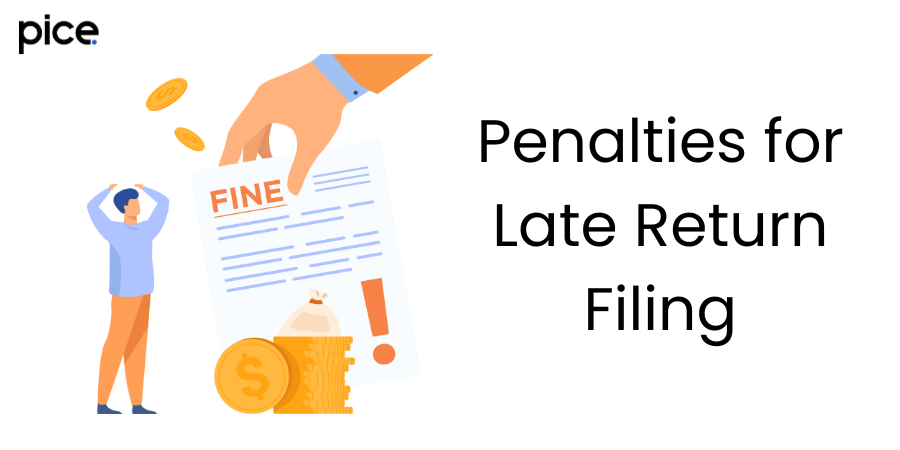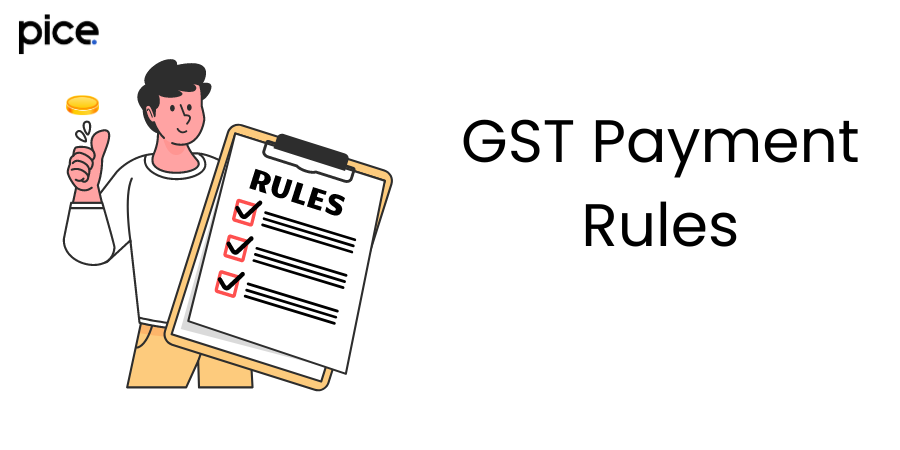Late Fees and Interest for GST Returns
- 25 Aug 24
- 11 mins

Late Fees and Interest for GST Returns
Key Takeaways
- Filing GST returns on time is crucial to avoid late fees and interest charges, ensuring smooth business operations and compliance.
- The late fee for GSTR-3B is ₹50 per day for regular returns and ₹20 per day for nil returns, with similar structures for other GST returns.
- An 18% per annum interest rate is imposed on delayed GST payments, calculated on the net tax liability after deducting input tax credits.
- The GST portal automatically calculates late fees, which must be paid when filing the subsequent month's or quarter's returns.
- GST payments can be made through various methods, including internet banking and credit cards, with specific rules for transactions over ₹10,000.
When a registered business fails to file Goods and Services Tax (GST) returns or pay tax liabilities on time, penalties in the form of late fees and interest are imposed by the tax department. According to GST regulations, late fees are incurred for delayed filing of returns, calculated daily until the return is filed.
Additionally, late payment of GST liabilities incurs interest, calculated on the net tax liability after deducting input tax credits, at an annual rate of 18%. Taxpayers are obligated to settle these charges promptly to comply with GST requirements and avoid further penalties.
This blog covers all you need to understand about these penalties for late filing of GST returns, focusing on the late fee for GSTR-3B and such other forms.
Understanding Late Fees in GST
As per GST laws, late fees are penalties imposed for delays in filing returns. These fees accrue daily from the prescribed due dates set by the tax authorities. Even if there are no sales, purchases or GST liabilities to declare in the return, late fees are imposed for the delay in submission.
💡 If you want to pay your GST with Credit Card, then download Pice Business Payment App. Pice is the one stop app for all paying all your business expenses.
This fee is determined based on the number of days of delay from the due date. For instance, if GSTR-3B is filed on 23rd June 2024, which is 3 days after the prescribed due date of 20th June 2024, the late fees will be calculated for these three days and must be paid in cash. As of now, the GST portal applies late fees exclusively to the following returns:
- GSTR-3B
Take a look at the following table to find out the late fees for delays in filing Form GSTR-3B:
| Name of the Act | Late fees for every day of delay |
| For Regular Taxpayers: | |
| Central Goods and Services Act, 2017 | ₹25 |
| Respective State Goods and Services Act, 2017 (or) Union Territory Goods and Services Act, 2017 | ₹25 |
| Total late fees to be paid per day | ₹50 |
| For Taxpayers with Nil Liability: | |
| Central Goods and Services Act, 2017 | ₹10 |
| Respective State Goods and Services Act, 2017 (or) Union Territory Goods and Services Act, 2017 | ₹10 |
| Total late fees to be paid per day | ₹20 |
- GSTR-4
Below are the late fees applicable for delays in filing Form GSTR-4:
| Name of the return | Type of return | Annual turnover in previous year | Maximum late fee under CGST | Maximum late fee under SGST | Maximum late fee |
| GSTR-4 (FY 21-22 onwards) | Nil return | NA | ₹250 | ₹250 | ₹500 |
| Other than Nil return | NA | ₹1,000 | ₹1,000 | ₹2,000 |
- GSTR-5
Here are the late fees applicable for delays in filing Form GSTR-5:
| Return Type | Late Fees |
| Nil Returns | ₹20 per day |
| Normal Returns | ₹50 per day |
| The maximum late fee is ₹5,000. | |
- GSTR-5A
If Form GSTR-5A is filed late, the following late fees apply:
| Return Type | Late Fees Applicable |
| Return for Normal Filing | ₹200 per day |
| Return for NIL Filing | ₹100 per day |
- GSTR-6
If you miss the prescribed deadline for filing Form GSTR-6, a fine of ₹50 per day is imposed. For filing a NIL return, the fine remains ₹50 per day with no reduction allowance.
- GSTR-8
If the GST return is filed late, a penalty of ₹100 per day under CGST and ₹100 per day under SGST, totalling ₹200 per day, will be charged, up to a maximum of ₹5,000. No late fee is applied to IGST for delayed submission.
- GSTR-7
Given below is the late fee structure associated with Form GSTR-7 filing:
| Name of the return | Type of return | Annual turnover in previous year | Maximum late fee under CGST | Maximum late fee under SGST | Maximum late fee |
| GSTR-7 (TDS filing under GST) | NA | NA | ₹1,000 | ₹1,000 | ₹2,000 |
- GSTR-9
Here is the fee structure applicable to late filing of Form GSTR-9:
| Name of the Act | For taxpayers whose turnover is up to ₹5 crore (Late fees for every day of delay) | For taxpayers whose turnover is more than ₹5 crores & up to ₹20 crore (Late fees for every day of delay) | For taxpayers whose turnover is more than ₹20 crore (Late fees for every day of delay) |
| Central Goods and Services Act, 2017 | ₹25 | ₹50 | ₹100 |
| Respective State Goods and Services Act, 2017 (or) Union Territory Goods and Services Act, 2017 | ₹25 | ₹50 | ₹100 |
| Total Late fees to be paid | ₹50* | ₹100 | ₹200 |
| Maximum late fees that can be charged | 0.04% of turnover in state or union territory | 0.04% of turnover in state or union territory | 0.25% of the turnover for the financial year |
Penalties for Late Return Filing

When individuals or businesses violate GST regulations by failing to file returns or missing filing deadlines, penalties are imposed as per the GST Act. Late GST payments can result in penalties up to ₹10,000, along with annual interest calculated from the due date to the actual filing date. Non-compliance could also lead to additional penalties such as ITC restrictions, increased tax liabilities and potential legal proceedings.
Interest Charges on Delayed GST Payments
Interest charges on delayed GST payments in India are imposed to ensure timely tax compliance. Under Section 50(1) of the CGST Act, 2017, taxpayers failing to pay on time face an 18% per annum interest rate. This accrues daily from the due date until the payment.
Latest Notification on GST Late Fees
During the 43rd GST Council meeting in June 2021, a few adjustments were announced regarding late fees and penalties for GST.
- In instances where Forms GSTR-1 and GSTR-3B are not filed, the maximum late fee per return amounts to ₹500 (i.e., ₹250 for CGST and ₹250 for SGST).
- If the annual turnover of the preceding fiscal year is up to ₹1.5 crore, a late fee of up to ₹2,000 per return may be levied (i.e.,₹1,000 each for CGST and SGST).
- In case the turnover is between ₹1.5 crore and ₹5 crore, a maximum penalty of ₹5,000 per return can be levied (i.e., ₹2,500 each for CGST and SGST).
- For turnovers over ₹5 crores, a late fee of ₹10,000 applies (₹5,000 each for CGST and SGST).
- From FY 2021-22, GSTR-4 late filing fees are standardized: ₹500 for nil filing and ₹2,000 for non-nil filing under CGST notification 21/2021 dated 1st June 2021.
- As per CGST announcement 22/2021 dated 1st June 2021, the late fee for GSTR-7 (TDS filing under GST) is capped at ₹2,000, with a reduced daily penalty rate from ₹200 to ₹50 per act, per return.
GSTR 3B Late Fees
GST Return 3-B late fees are charges imposed for filing of return after the due date, varying for normal and nil returns. Take a look at the following table to find out the applicable fee for each taxpayer.
| Return Type | Late Fee (Applicable on a Per Day Basis) |
| Normal Returns | ₹50 |
| Nil Returns | ₹20 |
Suppose that the due date for filing GSTR-3B is 20th July and a business files the return on 25th July, the late fee for normal taxpayers would be 5 days * ₹50 = ₹250, whereas, for a nil return filed on the same dates, the late fee would be 5 days * ₹20 = ₹100.
GSTR 1 Late Fees
The table below outlines the late fees applicable for filing Form GSTR-1 (excluding nil returns):
| Name of the Act | Late fees for every day of delay | Maximum late fee (If the annual turnover in the previous financial year is up to ₹1.5 crore) | Maximum late fee (If the annual turnover ranges between ₹1.5 crore and ₹5 crore) | Maximum late fee (If the turnover is more than ₹5 crore) |
| CGST Act, 2017 | ₹25 | ₹1,000 | ₹2,500 | ₹5,000 |
| Respective SCGT Act, 2017/UTGST Act, 2017 | ₹25 | ₹1,000 | ₹2,500 | ₹5,000 |
| Total late fees to be paid | ₹50 | ₹2,000 | ₹5,000 | ₹10,000 |
The following table details the late fees applicable for filing nil GSTR-1 returns:
| Name of the Act | Late fees for every day of delay | Maximum late fee |
| CGST Act, 2017 | ₹10 | ₹250 |
| Respective SCGT Act, 2017/UTGST Act, 2017 | ₹10 | ₹250 |
| Total late fees to be paid | ₹20 | ₹500 |
Paying Late Fees on the GST Portal
The GST portal automatically calculates the late fee when submitting returns. The amount payable as fees for the current return period must be settled at the time of filing the subsequent month or quarter returns. This fee is paid separately in cash for CGST and SGST through separate electronic cash/credit ledgers.
To file GST returns, settling the late fee is mandatory, covering any outstanding fees from the previous return period due to delays. On the other hand, late or non-payment of GST also results in additional interest charges.
Calculating Interest under GST
Interest accrues on delayed GST payments calculated on the net tax liability post deduction of input tax credits. This interest under GST is levied in the following scenarios:
- Late payment of CGST, SGST or IGST after the due date
- Excess input tax credit claim
- Reduction of excess output tax liability
Interest is mandatory if GST payments are not settled by the filing due date, subject to the following rates:
| Particulars | Interest |
| Tax paid after due date | 18% per annum |
| Excess ITC claimed or excess reduction in Output Tax | 24% per annum |
Applicable GST Payment Rules for Taxpayers

Understanding the applicable GST payment rules is essential for taxpayers to ensure compliance. Here are key rules to be aware of:
- When taxpayers make payments for tax, interest, penalties or fees through internet banking, credit card, NEFT or RTGS, the electronic cash ledger gets credited. Any remaining balance in this ledger can be utilised to settle outstanding interest, fees or other liabilities.
- Payment for GST PMT-06 is made through a challan valid for 15 days. After successful payment, a Challan Identification Number (CIN) is issued. If the CIN is not generated, taxpayers can file Form GST PMT-07.
- Challan payments below ₹10,000 can be made over the counter using currency, cheques, or demand drafts at approved banks. Payments exceeding ₹10,000 must be made digitally.
- After 8 p.m., all online payments will be transferred to the taxpayer’s account on the following day. All payments for taxes, fines, penalties and interest must be generated exclusively through the GST portal, as physical challans are not accepted for GST payments.
The Bottom Line
Timely GST return filing is crucial for all GST-registered taxpayers under GST. Failure to submit returns or settle tax liabilities promptly results in late fees and interest charges imposed by the authorities, including the late fee for GSTR-3B filing. Therefore, taxpayers must stay mindful of their due dates and ensure
 By
By 

















